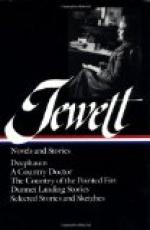As Mrs. Kew had said, there was “a power of china.” Kate and I were convinced that the lives of her grandmothers must have been spent in giving tea-parties. We counted ten sets of cups, beside quantities of stray ones; and some member of the family had evidently devoted her time to making a collection of pitchers.
There was an escritoire in Miss Brandon’s own room, which we looked over one day. There was a little package of letters; ship letters mostly, tied with a very pale and tired-looking blue ribbon. They were in a drawer with a locket holding a faded miniature on ivory and a lock of brown hair, and there were also some dry twigs and bits of leaf which had long ago been bright wild-roses, such as still bloom among the Deephaven rocks. Kate said that she had often heard her mother wonder why her aunt never had cared to marry, for she had chances enough doubtless, and had been rich and handsome and finely educated. So there was a sailor lover after all, and perhaps he had been lost at sea and she faithfully kept the secret, never mourning outwardly. “And I always thought her the most matter-of-fact old lady,” said Kate; “yet here’s her romance, after all.” We put the letters outside on a chair to read, but afterwards carefully replaced them, without untying them. I’m glad we did. There were other letters which we did read, and which interested us very much,—letters from her girl friends written in the boarding-school vacations, and just after she finished school. Those in one of the smaller packages were charming; it must have been such a bright, nice girl who wrote them! They were very few, and were tied with black ribbon, and marked on the outside in girlish writing: “My dearest friend, Dolly McAllister, died September 3, 1809, aged eighteen.” The ribbon had evidently been untied and the letters read many times. One began: “My dear, delightful Kitten: I am quite overjoyed to find my father has business which will force him to go to Deephaven next week, and he kindly says if there be no more rain I may ride with him to see you. I will surely come, for if there is danger of spattering my gown, and he bids me stay at home, I shall go galloping after him and overtake him when it is too late to send me back. I have so much to tell you.” I wish I knew more about the visit. Poor Miss Katharine! it made us sad to look over these treasures of her girlhood. There were her compositions and exercise-books; some samplers and queer little keepsakes; withered flowers and some pebbles and other things of like value, with which there was probably some pleasant association. “Only think of her keeping them all her days,” said I to Kate. “I am continually throwing some relic of the kind away, because I forget why I have it!”




